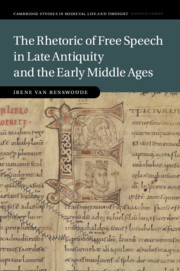Book contents
- The Rhetoric of Free Speech in Late Antiquity and the Early Middle Ages
- Cambridge Studies in Medieval Life and Thought Fourth Series
- The Rhetoric of Free Speech in Late Antiquity and the Early Middle Ages
- Copyright page
- Dedication
- Contents
- Acknowledgements
- Abbreviations
- Introduction
- Part I
- Part II
- 6 The Frank Holy Man
- 7 Gregory of Tours
- 8 The Wise Adviser
- 9 Agobard of Lyon
- 10 Pope Gregory
- Epilogue Part II
- Bibliography
- Index
9 - Agobard of Lyon
from Part II
Published online by Cambridge University Press: 23 September 2019
- The Rhetoric of Free Speech in Late Antiquity and the Early Middle Ages
- Cambridge Studies in Medieval Life and Thought Fourth Series
- The Rhetoric of Free Speech in Late Antiquity and the Early Middle Ages
- Copyright page
- Dedication
- Contents
- Acknowledgements
- Abbreviations
- Introduction
- Part I
- Part II
- 6 The Frank Holy Man
- 7 Gregory of Tours
- 8 The Wise Adviser
- 9 Agobard of Lyon
- 10 Pope Gregory
- Epilogue Part II
- Bibliography
- Index
Summary
This chapter studies the letters of Bishop Agobard of Lyon (d. 840), who was dismissed from the court of Louis the Pious in 822, after having delivered what appears to have been an inappropriate speech. It explores the ways in which Agobard adopted different voices of admonition and speaker positions to advise and criticise his emperor. This chapter mainly focusses on Agobard’s letters of admonition addressed to the emperor and his courtiers in the years during which he was shunned by the court. It addresses the question of whether Agobard was really an outsider, or merely styled himself as such in his letters to get his message across more effectively. A second question is the one that has informed every chapter of this book: that of the extent to which these letters can be situated in the framework of the rhetorical tradition of free speech.
- Type
- Chapter
- Information
- Publisher: Cambridge University PressPrint publication year: 2019

